
Official Edgar Rice Burroughs Tribute and Weekly Webzine Site
Since 1996 ~ Over 10,000 Web Pages in Archive
Presents
Volume 5026

Official Edgar Rice Burroughs Tribute and Weekly Webzine Site
Since 1996 ~ Over 10,000 Web Pages in Archive
Presents
Volume 5026
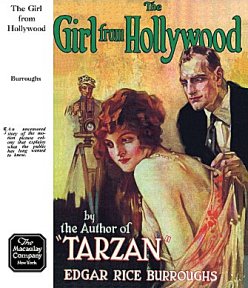
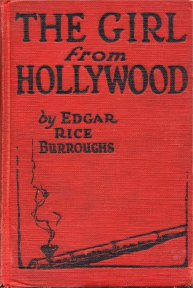
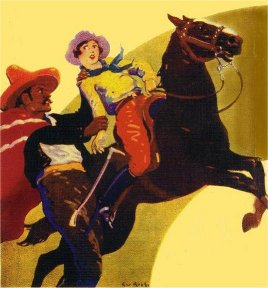
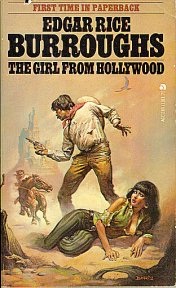
“Her mind is Tiffany twisted, she got the Mercedes bends
She got a lot of pretty, pretty boys she calls friends
How they dance in the courtyard, sweet summer sweat.
Some dance to remember, some dance to forget.”
– The Eagles, “Hotel California”Thankfully, Custer was faster on the draw than Slick Allen. Otherwise this would have been a short novel. You would have thought that Custer should have suspected more – he should have added up all of the clues and put something greater together. Remember, Allen called him a “cracker-fed dude,” and perhaps that was a good definition for our young firebrand, since he appears to be too arrogant of his position on the ranch to be overly fearful. The term “cracker” is used a lot today to signify white people. I have no idea of the origin of this word, but perhaps it has to do with a white person’s diet at the time, as Allen’s use suggests. Whatever the origin, I don’t suppose Allen meant it as a compliment. Let us get back to the story.
CHAPTER EIGHT
Beneath the cool shadows of the north porch the master of Ganado, booted and spurred, rested after a long ride in the hot sun, sipping a long, cool glass of peach brandy and orange juice, and talking to his wife.Yes, that’s Chapter 8: a lighthearted comedy relief scene while we get to know more about the inner workings of the family. One can imagine an almost replica conversation taking place around ERB’s north porch at the beginning of their stay on the Rancho. I also can imagine the Colonel sipping on a mint julip instead of a peach brandy and orange juice. Too bad he didn’t know about that bottle in Custer’s bedroom that was eight years in the wood.
She knew the dream that her husband had built, and that with it he had purposely blinded his eyes and dulled his ears to the truth which the mother heart would have been glad to deny, but could not. Some day one of the children would go away, and then the other. It was only right and just that it should be so, for as they two had built their own home and their own lives and their little family circle, so their children must do even as they.
It was going to be hard on them both, much harder on the father, because of that dream that had become an obsession. Mrs. Pennington feared that it might break his spirit, for it would leave him nothing to plan for and hope for as he had planned and hoped for during the twenty-two years that they had spent upon Ganado.
Now that Grace was going to the city, how could they hope to keep their boy content upon the ranch? She knew he loved the old place, but was entitled to see the world and to make his own place in it – not merely to slide spinelessly into the niche that another had prepared for him.
“I am worried about the boy,” she said presently.
“How? In what way?” he asked.
“He will be very blue and lonely after Grace goes,” she said.
“Damned foolishness, that’s what it is!” he blustered. “An actress! What does she know about acting?”
“Have you ever thought that some day our own children may want to go?” she asked.
“I won’t think about it!” he exploded.
“I hope you won’t have to,” she said; “but it’s going to be pretty hard on the boy after Grace goes.”
“Do you think he’ll want to go?” the colonel asked. His voice sounded suddenly strange and pleading, and there was a suggestion of pain and fear in his eyes that she had never seen there before in all the years that she had known him. “Do you think he’ll want to go?” he repeated in a voice that no longer sounded like his own.
“Stranger things have happened,” she replied, forcing a smile, “than a young man wanting to go out into the world and win his spurs!”
“Let’s not talk about it, Julia,” the colonel said presently. “You are right, but I don’t want to think about it. When it comes will be time enough to meet it. If my boy wants to go, hke shall go – and he shall never know how deeply his father is hurt!”
“There they are now,” said Mrs. Pennington. “I hear them in the patio. Children!” she called. “Here we are on the north porch!”
They came through the house together, brother and sister, their arms about each other.
“Cus says I am too young to get married,” exclaimed the girl.
“Married!” ejaculated the colonel. “You and Guy talking of getting married? What are you going to live on, child?”
“On the hill back there.”
She jerked her thumb in a direction that was broadly south by west.
“That will give them two things to live on,” suggested the boy, grinning.
“What do you mean – two things?” demanded the girl.
“The hill and father,” her brother replied, dodging.
She pursued him, and he ran behind his mother’s chair; but at last she caught him, and, seizing his collar, pretended to chastise him, until he picked her up bodily from the floor and kissed her.
“Pity the poor goof she ensnares!” pleaded Custer, addressing his parents. “He will have three avenues of escape – being beaten to death, starved to death, or talked to death.”
Eva clapped a hand over his mouth.
“Now listen to me,” she cried. “Guy and I are going to build a teeny, weeny bungalow on that hill, all by ourselves, with a white tile splash board in the kitchen, and one of those broom closets that turn into an ironing board, and a very low, overhanging roof, almost flat, and a shower, and a great big living room where we can take up the rugs and dance, and a spiffy little garden in the back yard, and chickens, and Chinese rugs, and he is going to have a study all to himself where he writes his stories, an –”
At last she had to stop and join in the laughter.
“I think you are all mean,” she added. “You always laugh at me!”
“With you, little jabberer,” corrrected the colonel; “for you were made to be laughed with and kissed.”
“Then kiss me,” she exclaimed, and sprang into his lap, at the imminent risk of deluging them both with ‘elixer’ – a risk which the colonel, through long experience of this little daughter of his, was able to minimize by holding the glass at arm’s length as she dived for him.
“And when are you going to be married?” he asked.
“Oh, not for ages and ages!” she cried.
“But are you and Guy engaged?”
“Of course not!”
“Then why in the world all this talk about getting married?” he inquired, his eyes twinkling.
“Well, can’t I talk?” she demanded.
“Talk? I’ll say she can!” exclaimed her brother.The coming dread of empty-nest syndrome must have been a constant nag in the back of ERB's mind during this period. All of his fears come out in this story. Well, let's see what Chapter 9 has in store.
CHAPTER NINE
Two weeks later Grace Evans left for Hollywood and fame. She would permit no one to accompany her, saying that she wanted to feel that the moment she left home she had made her own way, unassisted, toward her goal.Will Guy Evans find success in the booze trade? Or will he be double-crossed? Do we have to guess?
Hers was the selfish egotism that is often to be found in otherwise generous natures. She had never learned the sweetness and beauty of sharing – of sharing her ambitions, her successes, and her failures, too, with those who loved her. If she won to fame, the glory would be hers; nor did it once occur to her that she might have shared that pride and pleasure with others by accepting their help and advice. If she failed, they would not have even the sad sweetness of sharing her disappointment.
Over two homes there hovered that evening a pall of gloom that no effort seemed able to dispel. In the ranch house on Ganado they made a brave effort at cheerfulness on Custer Pennington’s account. They did not dance that evening, as was their custom, nor could they find pleasure in the printed page which they tried to read. Bridge proved equally impossible.
Finally Custer arose, announcing that he was going to bed. Kissing them all good night, as had been the custom since childhood, he went to his room, and tears came to the mother’s eyes as she noted the droop in the broad shoulders as he walked from the room.
The girl came then and knelt beside her, taking the older woman’s hand in hers and caressing it.
“I feel so sorry for Cus,” she said. “I believe that none of us realize how hard he is taking this. He told me yesterday that it was going to be just the same as if Grace was dead, for he knew she would never be satisfied here again, whether she succeeded or failed. I think he had definitely given up all hope of their being married.”
“Oh, no, dear, I am sure he is wrong,” said her mother. “The engagement has not been broken. In fact Grace told me only a few days ago that she hoped her success would come quickly, so that she and Custer might be married the sooner.
The dear girl wants us to be proud of our new daughter.”
“My God!” ejaculated the colonel, throwing his book down and rising to pace the floor. “Proud of her! Weren’t we already proud of her? Will being an actress make her any dearer to us? Of all the damn fool ideas!”
“Custer! Custer! You mustn’t swear so before Eva,” reproved Mrs. Pennington.
A merry peal of laughter broke from the girl, nor could her mother refrain from smiling.
“It isn’t swearing when popsy says it,” cried the girl. “My gracious, I’ve heard it all my life, and you always say the same thing to him, as if I’d never heard a single little cuss word. Anyway, I’m going to bed now, popsy, so that you won’t contaminate me. According to momsy’s theory she should curse like a pirate by this time, after twenty-five years of it!”
She kissed them, leaving them alone in the little family sitting room.
“I hope the boy won’t take it too hard,” said the colonel after a silence.
“I am afraid he has been drinking a little too much lately,” said the mother.
“I only hope his loneliness for Grace won’t encourage it.” “I hadn’t noticed it,” said the colonel.
“He never shows it much,” she replied. “An outsider would not know that he had been drinking at all when I can see that he has had more than he should.”
“Don’t worry about that, dear,” said the colonel. “A Pennington never drinks more than a gentleman should. His father and his grandsires, on both sides, always drank, but there has never been a drunkard in either family. I wouldn’t give two cents for him if he couldn’t take a man’s drink like a man; but he’ll never go too far. My boy couldn’t.”
The pride and affection in the words brought the tears to the mother’s eyes. She wondered if there had ever been father and son like these before – each with such implicit confidence in the honor, integrity, and the manly strength of the other. His boy couldn’t go wrong!
Wow, what a totally different psychology from today’s twelve-step recovery modality, where anyone who drinks has a problem with alcohol just because they want a drink: “Oh, you want a drink! Why would want a drink? Obviously, you’re an alcoholic. If you can’t see that, then you’re in denial.” You just can’t win arguing with this logic.
I’ve been told that I can no longer enter Canada, where I once was a landed immigrant, because of a 2002 DUI misdemeanor conviction, which according to the Canadian government makes me a criminal with a criminal record. Only modern comforts keep me from longing for yesterday.
Custer Pennington entered his room, lighted a reading lamp beside a deep, wide-armed chair, selected a book from a rack, and settled himself comfortably for an hour of pleasure and inspiration. But he did not open the book. Instead, he sat staring blindly at the opposite wall.
She would never come back and why should she? In the city, in that new life, she would meet men of the world – men of broader culture than his, men of wealth – and she would be sought after. They would have more to offer her than he, and sooner or later she would realize it. He could not expect to hold her.
Custer laid aside his book.
“What’s the use?” he asked himself.
Rising, he went to the closet and brought out a bottle. He had not intended drinking. On the contrary, he had determined very definitely not to drink that night; but again he asked himself the old question which, under certain circumstances of life and certain conditions of seeming hopelessness, appears unanswerable.
“What is the use?”
It is a foolish question, a meaningless question, a dangerous question. What is the use of what? Of combatting fate – of declining to do the thing we ought not to do – of doing the thing we should do? It is not even a satisfactory means of self-justification; but amid the ruins of his dreams it was sufficient excuse for Custer Pennington’s surrender to the craving of an appetite which was daily becoming stronger.
The next morning he did not ride before breakfast with the other members of the family nor in fact, did he breakfast until long after they.
On the evening of the day of Grace’s departure Mrs. Evans retired early, complaining of a headache. Guy Evans sought to interest himself in various magazines, but he was restless and too ill at ease to remain long absorbed. At frequent intervals he had consulted his watch, and as the evening wore on he made numerous trips to his room, where he had recourse to a bottle like the one with which Custer Pennington was similary engaged.
It was Friday – the second Friday since Guy had entered into an agreement with Allen; and as midnight approached his nervousness increased.
Time and again, during that long evening, he mentally reiterated his determination that once this venture was concluded, he would never embark upon another of a similar nature. The several thousand dollars which it would net him would make it possible for him to marry Eva and settle down to a serious and uninterrupted effort at writing – the one vocation for which he believed himself best fitted by inclination and preparation; but never again, he assured himself repeatedly, would he allow himself to be cajoled or threatened into such an agreement.
As he sat waiting for the arrival of the second consignment, he pictured the little cavalcade winding downward along hidden trails through the chapperal of dark, mountain ravines. His nervousness increased as he realized the risk of discovery some time during the six months that it would take to move the contraband to the edge of the valley in this way – thirty-six cases at a time, packed out on six burros.
He had little fear of the failure of his plan for hiding the liquor in the old hay barn and moving it out again the following day. For three years there had been stored in one end of the barn some fifty tons of baled melilotus. It had been sown as a cover crop by a former foreman, and allowed to grow to such proportions as to render the ploughing of it under a practical impossibility. As hay it was in little or no demand, but there was a possibility of a hay shortage that year. It was against this possibility that Evans had had it baled and stored away in the barn, where it had lain ever since, awaiting an offer that would at least cover the cost of growing, harvesting, and baling. A hard day’s work had so re-arranged the bales as to form a hiding chamber in the center of the pile, ingress to which could readily be had by removing a couple of bales near the floor.
A little after eleven o’clock Guy left the house and made his way to the barn, where he paced nervously to and fro in the dark interior. He hoped that the men would come early and get the thing over, for it was this part of the operation that seemed most fraught with danger.
The whisky was in Guy’s possession for less than twelve hours a week; but during those twelve hours he earned the commission of a dollar a bottle that Allen allowed him, for his great fear was that sooner or later some one would discover and follow the six burros as they came down to the barn. There were often campers in the hills. During the deer season, if they did not have it all removed by that time, they would be almost certain of discovery, since every courageous ribbon-counter clerk in Los Angeles hied valiantly to the mountains with a high-powered rifle, to track the ferocious deer to its lair.
At a quarter past twelve Evans heard the sounds for which he had been so expectantly waiting. He opened a small door in the end of the hay barn, through which there filed in silence six burdened burros, led by one swarthy Mexican and followed by another. Quietly the men unpacked the burros and stored the thirtysix cases in the chamber beneath the hay. Inside this same chamber, by the light of a flash lamp, Evans counted out to one of them the proceeds from the sale of the previous week. The whole transaction consumed less than half an hour, and was carried on with the exchange of less than a dozen words. As silently as they had come the men departed, with their burros, into the darkness toward the hills, and young Evans made his way to his room and to bed.
CHAPTER TEN
As the weeks passed, the routine of ranch life weighed more and more heavily on Custer Pennington. The dull monotony of it took the zest from the things that he had formerly regarded as the pleasures of existence. The buoyant Apache no longer had power to thrill. The long rides were but obnoxious duties to be performed. The hills had lost their beauty.Don’t ask me what K.K.S. stands for. I imagine it is like RKO or MGM, combinations of letters that stand for the names of its owners. Whatever, there were many of these in the early days of the Hollywood silent era.
he frequent letters that came from Grace during her first days in Hollywood had breathed a spirit of hopefulness and enthusiasm that might have proven contagious, but for the fact that he saw in her success a longer and probably a permanent separation. If she should be speedily discouraged she might return to the foothills and put the idea of a career forever from her mind; but if she received even the slightest encouragement, Custer was confident that nothing could wean her from her ambition. He was more sure of this because in his own mind he could picture no inducement sufficiently powerful to attract any one to return to the humdrum existence of the ranch. Better be a failure in the midst of life, he put it to himself, than a success in the unpeopled spaces of its outer edge.
Ensuing weeks brought fewer letters, and there was less of enthusiasm, though hope was still unquenched. She had not yet met the right people, Grace said, and there was a general depression in the entire picture industry.
The little gatherings of the neighbors at Ganado continued. Other young people of the valley and the foothills came and danced, or swam, or played tennis. Their elders came, too, equally enjoying the hospitality of the Penningtons; and among these was the new owner of the little orchard beyond the Evans ranch.
As she came oftener, and came to know the Penningtons better, she depended more and more on the colonel for advice in matters pertaining to her orchard and her finances. Of personal matters she never spoke. They knew that she had a daughter living in Los Angeles; but of the girl they knew nothing, for deep in the heart of Mrs. George Burke, who had been born Charity Cooper, was a strain of Puritanism that could not look with aught but horror upon the stage and its naughty little sister, the screen – though in her letters to that loved daughter there was no suggestion of the pain that the fond heart held because of the career the girl had chosen.
While life upon Ganado took its peaceful way, outwardly unruffled, the girl whose image was in the hearts of them all strove valiantly in the face of recurring disappointment toward the high goal upon which her eyes were set.
She was interviewing, for the dozenth time, the casting director of K.K.S. Studio, who had come to know her by sight, and perhaps to feel a little compassion for her – though there are those who will tell you that casting directors, having no hearts, can never experience so human an emotion as compassion.
“I’m sorry, Miss Evans,” he said; “but I haven’t a thing for you today.” As she turned away, he raised his hand. “Wait!” he said. “Mr. Crumb is casting his new picture himself. He’s out on the lot now. Go out and see him – he might be able to use you.”
A few minutes later she found the man she sought. She had never seen Wilson Crumb before, and her first impression was a pleasant one, for he was courteous and affable. She told him that she had been to the casting director, and that he had said that Mr. Crumb might be able to use her. As she spoke, the man watched her intently, his eyes running quickly over her figure without suggesting offence.
“What experience have you had?” he asked.
“Just a few times as an extra,” she replied.
He shook his head.
“I am afraid I can’t use you,” he said; “unless” – he hesitated – “unless you would care to work in the semi-nude, which would necessitate making a test – in the nude.”Yes, isn’t that Wilson Crumb one subtle manipulator? Can you guess where this is going? In many ways this book reminds me of Charles Dickens and his masterpiece, Great Expectations. There are many characters with many intertwining stories and it isn’t until the very end that he brings all of the “coincidences” together, tying them into a smart knot. The same goes for this book: almost everyone who appears is connected in some way or another. ERB was the king of coincidence. They say “write what you know,” and ERB knew that coincidence was the norm and not the exception, and so he wrote of it.
“Is that absolutely essential?” she asked.I love that scene because it captures perfectly the full personality of Hidalgo and I had an epiphany of why the movie was named after him. I can easily imagine the Apache with this kind of personality. Remember Bucephalus, Alexander the Great’s war horse? Or Whiskey Jack, the spirited horse that ERB broke as a kid on his brothers’ ranch in Idaho? Horses are just as important as people to ERB.
“Quite so,” he replied.
Still she hesitated. Her chance! If she let it pass, she might as well pack up and return home. What a little thing to do, after all, when one really considered it! It was purely professional. There would be nothing personal in it, if she could only succeed in overcoming her self-consciousness; but could she do it?
Ah, the gradual slippery slope that leads to all sorts of rationalizations. Many porn stars began with this attitude. And of course, Crumb was right: gratuitous nudity is always absolutely essential in Hollywood. Who doesn’t want to see a famous Hollywood actress in the nude? Note that Grac’s mother is not a Puritanical prude like Gaza de Lure’s. I don’t think I’m spoiling anything here: the connection is stated plainly at the end of the chapter. Wait and see.
Two hours later Grace Evans left the K.K.S. lot. She was to start work on the morrow at fifty dollars a week for the full period of the picture. Wilson Crumb had told her that she had a wonderful future, and that she was fortunate to have fallen in with a director who could make a great star of her. As she went, she left behind all her self-respect and part of her natural modesty.
Wilson Crumb, watching her go, rubbed the ball of his right thumb to and fro across the back of his left hand, and smiled.
Well, how far do you think she went in her nude screen test? Do you think Wilson gave her some “aspirin” to loosen her up? Do you believe she’s still a virgin, assuming that she and Custer had never gone all the way? What do you think ERB meant when he says that she lost “all” of her self-respect and “part” of her natural modesty? And last, has Grace Evans doomed herself?
And what about her future relationship with Custer? At the time no respectable man would marry a woman who was not a virgin. Has Grace now become damaged goods, which was a popular saying for fallen women when I was in the 9th grade?
The Apache danced along the wagon trail that led back into the hills. He tugged at the bit and tossed his head impatiently, flecking the rider’s shirt with foam. He lifted his feet high and twisted and wriggled like an eel. He wanted to be off, and he wondered what had come over his old pal that there was no more swift gay gallops, and that washes were crossed sedately by way of their gravelly bottoms, instead of being taken with a flying leap.
The reminds me of the seminal scene in the movie Hidalgo, where the horse, a Mustang racing against the finest Arabian horses in Arabia – after his rider has given up in fear that going on would cause irreparable harm to the horse – bumps his rider with his head, as if saying,
“Don’t worry about me, I haven’t given up – I’ve just begun to race!”It was Friday. From the hill beyond Jackknife a man had watched through binoculars his every move. Three other men had been waiting below the watcher along the new-made trail.We learn that Gaza de Lure’s real name is Shannon Burke and that her mother does not have long to live. It looks like we are not going to learn much about Shannon from her mother.
“It was young Pennington,” he said. The speaker was Allen. “I was thinking that it would be a fool trick to kill him, unless we have to. I have a better scheme. Listen – if he ever learns anything that he shouldn’t know, this is what you are to do, if I am away.”
Very carefully and in great detail he elaborated his plan. “Do you understand?” he asked.
They did, and they grinned.
The following night, after the Penningtons had dined, a ranch hand came up from Mrs. Burke’s to tell them that their new neighbor was quite ill, and that the woman who did her housework wanted Mrs. Pennington to come down at once as she was worried about her mistress.
“We will be right down,” said Colonel Pennington.
They found Mrs. Burke breathing with difficulty, and the colonel immediately telephoned for a local doctor. After the physician had examined her, he came to them in the living room.
“You had better send for Jones, of Los Angeles,” he said. “It is her heart. I can do nothing. I doubt if he can; but he is a specialist. And,” he added, “if she has any near relatives, I think I should notify them – at once.”
The housekeeper had joined them, and was wiping tears from her face with her apron.
“She has a daughter in Los Angeles,” said the colonel; “but we do not know her address.”
“She wrote to her today, just before this spell,” said the housekeeper.
“The letter hasn’t been mailed yet – here it is.”
She picked it up from the center of the table and handed it to the colonel.
“Miss Shannon Burke, 1580 Panizo Circle, Hollywood,” he read. “I will take the responsibility of wiring both Miss Burke and Dr. Jones. Can you get a good nurse locally?”
The doctor could, and so it was arranged.It’s too bad that just when they were getting to know her, she has a heart “spell”. Is this part of ERB’s scheme? You betcha!
We will review and analyze Chapters 11 and 12 in the next installment.
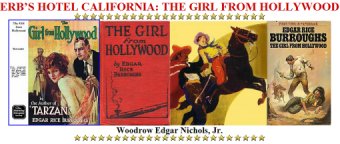
Read
The
Girl From Hollywood Text in ERBzine
See
the ERBzine Bibliography Entry
BACK TO EDGAR RICE
BURROUGHS' TARZANA RANCH 1921 - Docu/Novel
.
![]()
INTRODUCTORY AND CONTENTS PAGE
FOR
THE EDGAR RICE BURROUGHS ARTICLES
BY WOODROW EDGAR NICHOLS, JR.

www.ERBzine.com/nichols
|
|
THE TRIMESTERS OF CASPAK |
|
by Woodrow Edgar Nichols, Jr. INTRODUCTION and CONTENTS |
![]()

![]()

BILL
HILLMAN
Visit
our thousands of other sites at:
BILL
AND SUE-ON HILLMAN ECLECTIC STUDIO
All
ERB Images© and Tarzan® are Copyright ERB, Inc.- All Rights Reserved.
All
Original Work © 1996-2014 by Bill Hillman and/or Contributing Authors/Owners
No
part of this web site may be reproduced without permission from the respective
owners.